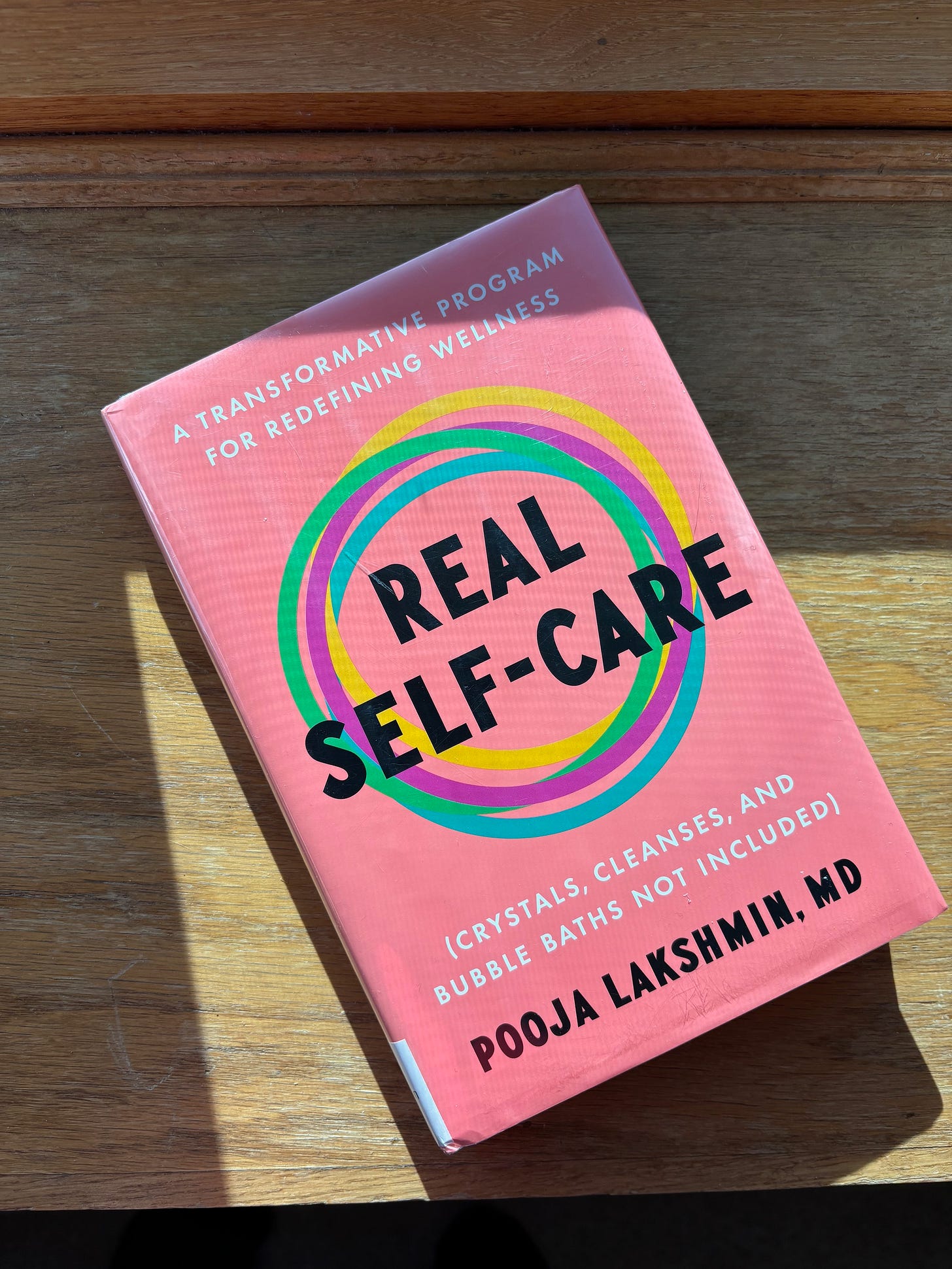Self-Care: A Purposeful Endeavor or Total Fluff?
Reflections + reading prompts on personal well-being, social impact, and the book, Real Self-Care, by Pooja Lakshmin!
Book Club Members: The topic of personal well-being and the book, Real Self-Care by Pooja Lakshmin, will help guide our discussions in *February*! (I’m sending this out early for those who like a bit more prep time - you’ll find prompts for our *January* discussions, all about priorities/prioritizing, here.) Not a member of the Reading And Purpose Nonfiction Book Club yet and want to be? It’s an automatic benefit for paid subscribers - upgrade today or click here to learn more!
In recent years, the term ‘self-care’ seems to have run the gamut from a vital area on which to focus our attention, to an unattainable list of requirements only a select few can maintain, to a buzzword that has lost its meaning altogether.
Personally, I am somewhat baffled by how endearing I find the idea of ‘caring for myself’ yet cringe a bit when I hear the term ‘self-care.’ I mean, it’s the exact same thing, right?

In her book Real Self-Care, Dr. Pooja Lakshmin shed so much light on all of this for me. From the opening pages where she discusses societal and cultural challenges that need to be addressed in the self-care conversation, to later in the book where she emphasizes honoring our values and recognizing the role things like guilt or worthiness play, she has somehow made self-care feel more expansive yet also more sustainable - and removed the ‘cringe,’ too.
“I’m not here to give you advice from the top of the mountain,” Lakshmin writes. “I’m here as a fellow traveler alongside you.” Somehow these words, coming from a medical professional and board-certified psychiatrist, also shifted the conversation around self-care and personal well-being for me. Perhaps self-care isn’t yet another item to check off the list each day or week (or to feel guilty about when, instead of checking it off, we carry it over, unchecked, day after week after month), but rather a holistic, values-affirming way of being in the world.
I’m already breathing a bit easier. How about you?
Reflection Guide for PERSONAL WELL-BEING + Real Self-Care
Feel free to reflect on the following questions in your journal, while on a walk, or as you read Real Self-Care by Pooja Lakshmin. Some of these will also serve as prompts for our February book club discussions!
(As always, book club members can still fully participate in the discussion even if you don’t read the book. Just bring along your own life experience!)
What first comes to mind when you hear the term ‘self-care’? How would you personally define it? Do you think of certain activities, lifestyle changes, ‘hacks,’ or something else?
What self-care practices (however you personally define the term) have you found helpful in your own life?
Related to the above two questions, how does the term self-care make you feel? Inspired? Guilty? Peaceful? Motivated? Like more to-do’s to add to an already full list? Something else entirely?
In January, our book club theme focuses on priorities. How much of a priority is your personal well-being and self-care? Are you satisfied with its priority level? If you’d like to move it up or down in priority, what might help you do so?
In her book, Real Self-Care, Lakshmin writes, “Self-care is not a thing to do - it’s a way to be.” When you think of self-care as a way of being rather than a set of activities in which to engage, does that change anything for you? Does it make self-care seem more doable, or less so?

You can find more of my thoughts on Real Self-Care in My Top 10 Nonfiction Books of the Year. Lakshmin describes ‘faux’ self-care as external or being prescribed from the outside, such as a fancy face cream. ‘Real’ self-care, on the other hand, originates within each of us, such as our internal decision-making processes. What do you see as pros and cons to faux self-care? How about pros and cons to real self-care? Is there still value to be found in faux self-care, and if so, what?
Who are some of your role models in personal well-being? What do you admire or appreciate about them?
When considering self-care, how much have you also considered things like capitalism, ableism, or systemic oppression? Has that changed since reading Real Self-Care? How has one (or more) of these impacted your own experience with self-care?
What role has guilt played in your personal well-being? When you do engage in some form of care for yourself, are you able to fully embrace it - or do you have guilt and/or ‘shoulds’ running through your mind? How can we lessen the guilt when it comes to caring for ourselves?
How might you caring for your personal well-being benefit others?
One of my favorite sections of Real Self-Care appears in chapter 8, where Lakshmin discusses self-care as an ‘assertion of power.’ She gives examples of self-care in action, such as when Simone Biles withdrew from the Olympics in favor of her mental health and well-being (and the reactions that decision prompted), as well as the role of collective care/paying it forward, such as people who advocate tirelessly for legal changes from which they themselves will not personally benefit. Have you ever thought of self-care as a form of power? What do you believe prompts people to advocate for things from which they will not benefit - and how do you think that impacts their sense of self-care? In what ways can self-care help us become more powerful, individually and/or collectively?
After reading this book, reflecting on these questions, and/or engaging in our book club discussion, what now comes to mind when you hear the term ‘self-care’? Is your response different than back when we considered this same question with prompt #1 above?
If you’re a member of the Reading And Purpose Nonfiction Book Club (an automatic benefit to paid subscribers), you’ll get further discussion details closer to the date. If you’re not a member yet and would like to be, simply upgrade your subscription and you’re in!
Questions? Comments? Books or topics you’d like me to discuss here? Feel free to email me at readingandpurpose (at) gmail (dot) com or comment on this post directly in the app/website. I love hearing from you and I appreciate your support!




